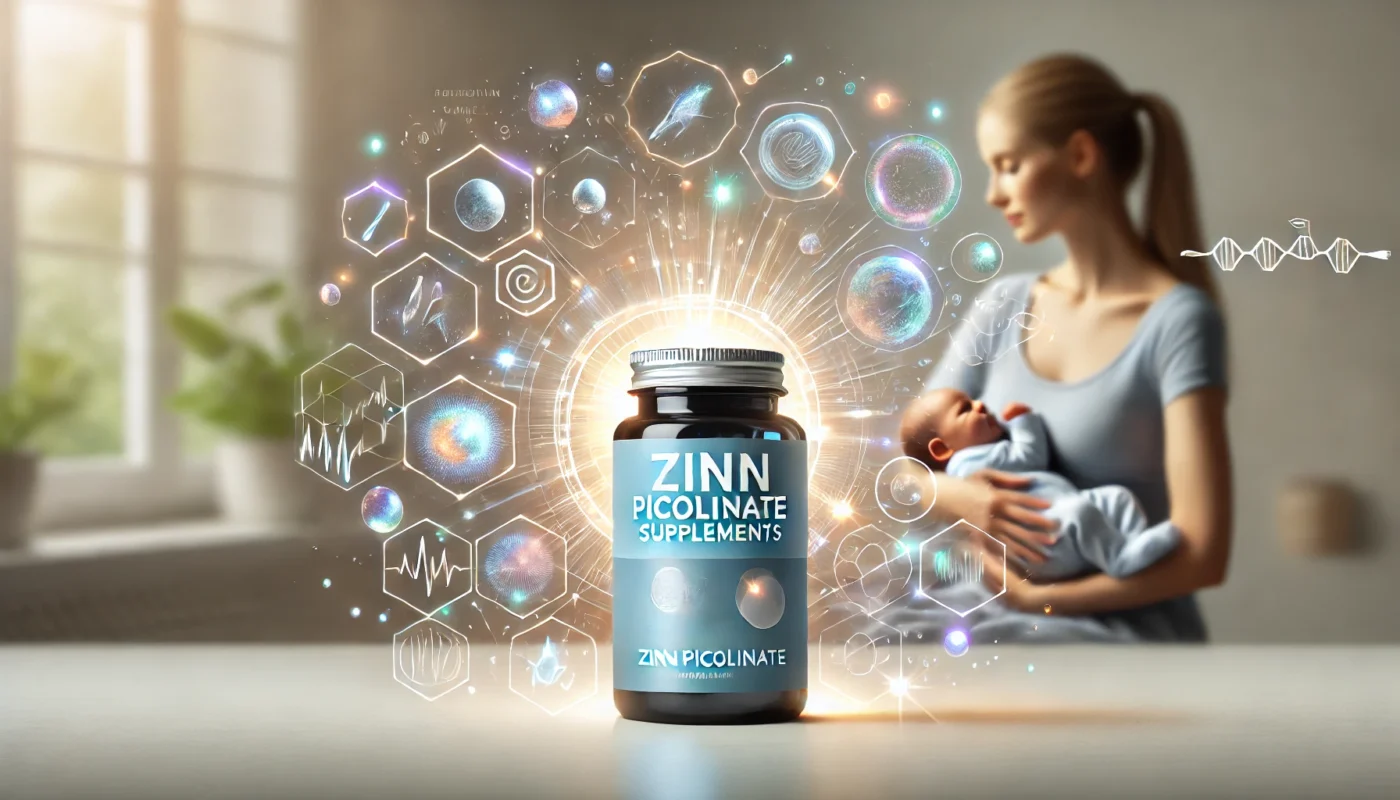The postpartum period, often referred to as the “fourth trimester,” is a transformative time for new mothers. Physical recovery from childbirth, hormonal fluctuations, and the demands of caring for a newborn can be overwhelming. During this period, proper nutrition plays a vital role in promoting healing, restoring hormonal balance, and supporting overall well-being. Among the key nutrients required for postpartum recovery, zinc stands out for its multifaceted benefits. Zinc picolinate, a highly bioavailable form of zinc, offers a practical solution for meeting the increased nutritional demands of postpartum women.
This article explores how zinc picolinate aids in postpartum recovery, from wound healing and immune support to hormone regulation and mental health.
You May Also Like:
Enhancing Detoxification Pathways: The Role of Zinc Picolinate
Zinc Picolinate for Healthy Aging: Fighting Oxidative Stress
Zinc Picolinate for Postpartum Recovery: Hormonal and Physical Support is an original (HSLHealing) article.
The Importance of Zinc in Postpartum Recovery
Zinc is an essential trace mineral involved in numerous biological processes, many of which are critical during the postpartum period. These include:
- Wound Healing: Zinc supports tissue repair and collagen synthesis, essential for recovery from vaginal or cesarean births.
- Hormonal Regulation: Zinc plays a role in balancing reproductive and stress hormones, aiding the transition to postpartum hormonal stability.
- Immune Function: Zinc strengthens the immune system, helping mothers resist infections during a period of physical vulnerability.
- Mood and Mental Health: Zinc contributes to neurotransmitter function, which may help reduce the risk of postpartum depression (PPD).

What Is Zinc Picolinate?
Zinc picolinate is a chelated form of zinc, where zinc is bound to picolinic acid. This structure enhances zinc’s absorption in the gastrointestinal tract, making it one of the most bioavailable forms of zinc supplementation. Postpartum women, who may face challenges in nutrient absorption due to hormonal changes or dietary restrictions, can particularly benefit from zinc picolinate.
Nutritional Demands in the Postpartum Period
During the postpartum period, the body undergoes significant physiological changes. These changes create increased nutritional demands, particularly for zinc. According to the World Health Organization (WHO), zinc deficiency is a global concern, with up to 17% of people affected worldwide. Women in the postpartum period are at even greater risk due to:
- Nutrient Depletion from Pregnancy: The body prioritizes fetal development during pregnancy, often depleting maternal zinc stores.
- Blood Loss During Delivery: Significant blood loss can reduce zinc levels, compromising recovery.
- Breastfeeding Demands: Lactation increases the need for zinc, as it is transferred to the infant through breast milk.
The Benefits of Zinc Picolinate for Postpartum Recovery
1. Enhancing Wound Healing
Whether recovering from a vaginal delivery or a cesarean section, wound healing is a primary focus during postpartum recovery. Zinc is essential for collagen synthesis, tissue repair, and cell proliferation.
- Research Evidence: A study in Advances in Wound Care found that zinc supplementation accelerated wound healing by promoting epithelialization and reducing inflammation. Women recovering from cesarean deliveries or perineal tears may particularly benefit from adequate zinc intake.
2. Supporting Hormonal Balance
Hormonal fluctuations are a hallmark of the postpartum period, as levels of estrogen, progesterone, and other hormones rapidly decline after delivery. Zinc helps regulate these hormones and supports the function of the hypothalamic-pituitary-adrenal (HPA) axis, which governs the body’s stress response.
- Impact on Prolactin: Zinc influences the production of prolactin, a hormone essential for breastfeeding.
- Thyroid Health: Zinc also supports thyroid function, reducing the risk of postpartum thyroiditis—a condition that affects up to 10% of women.
- Clinical Insight: A study in Biological Trace Element Research highlighted zinc’s role in stabilizing hormonal fluctuations in postpartum women, promoting faster recovery.
3. Boosting Immune Function
The postpartum period leaves many women immunocompromised due to physical stress and nutrient depletion. Zinc strengthens the immune system by supporting the production of white blood cells and reducing inflammation.
- Research Evidence: A clinical study in Nutrients demonstrated that zinc supplementation significantly improved immune function in postpartum women, reducing the incidence of infections such as mastitis.
4. Reducing Postpartum Depression (PPD)
Postpartum depression affects approximately 10–15% of new mothers. Zinc’s role in neurotransmitter function makes it a potential ally in reducing PPD risk. It regulates serotonin, dopamine, and GABA—neurotransmitters associated with mood stability.
- Research Evidence: A study in Journal of Affective Disorders found that women with low zinc levels were more likely to experience symptoms of depression. Zinc supplementation improved mood and reduced depressive symptoms in postpartum women.
5. Supporting Lactation
Zinc is critical for milk production and quality. Breastfed infants rely on maternal zinc stores to meet their developmental needs, making supplementation important for both mother and baby.
- Research Insight: A study in Pediatric Research revealed that zinc supplementation increased zinc concentration in breast milk, supporting the infant’s growth and immune function.

Recommended Dosage of Zinc Picolinate for Postpartum Women
The recommended dietary allowance (RDA) for zinc in postpartum women is:
- Lactating women aged 19 and older: 12 mg/day
- Lactating women aged 14–18: 13 mg/day
Therapeutic doses of zinc picolinate may range from 25–40 mg/day, particularly for women recovering from cesarean sections or experiencing significant nutrient depletion. However, excessive zinc intake (above 40 mg/day) can lead to side effects, including nausea, gastrointestinal upset, and interference with copper absorption. Always consult a healthcare provider to determine the appropriate dosage.
Dietary Sources of Zinc
While zinc picolinate supplementation is an effective way to meet postpartum needs, dietary sources should not be overlooked. Foods rich in zinc include:
- Animal-Based Sources: Oysters (the highest natural source), red meat, poultry, and eggs.
- Plant-Based Sources: Legumes (e.g., lentils, chickpeas), seeds (e.g., pumpkin seeds, sunflower seeds), nuts, and whole grains.
Vegetarian or vegan mothers may benefit more from supplementation due to the lower bioavailability of plant-based zinc.
Combining Zinc Picolinate with Other Nutrients for Optimal Recovery
Zinc picolinate works synergistically with other nutrients to enhance postpartum recovery:
- Iron:
Zinc and iron are essential for oxygen transport and tissue repair. However, excessive iron can inhibit zinc absorption, so balance is crucial. - Vitamin C:
Vitamin C supports collagen synthesis and immune function, complementing zinc’s role in wound healing. - Magnesium:
Magnesium helps regulate mood and reduce stress, while zinc supports hormonal balance. - Omega-3 Fatty Acids:
Omega-3s, found in fish oil, reduce inflammation and improve mood, enhancing zinc’s benefits for postpartum depression.

Potential Challenges and Solutions
1. Digestive Sensitivity:
Some women may experience nausea or digestive upset from zinc supplements. Taking zinc picolinate with food can reduce these effects.
2. Copper Deficiency:
High doses of zinc can deplete copper levels. Opt for a supplement that includes a small amount of copper to maintain balance.
3. Personalized Needs:
Each woman’s postpartum recovery is unique. Work with a healthcare provider to tailor supplementation to your specific needs.
Future Research Directions
While existing studies highlight zinc’s importance in postpartum recovery, further research is needed to:
- Explore the long-term effects of zinc supplementation on maternal and infant health.
- Investigate the role of zinc in reducing postpartum complications, such as infections or excessive bleeding.
- Assess the interaction of zinc with other micronutrients in postpartum women.
Conclusion: Zinc Picolinate for Postpartum Recovery
Zinc picolinate offers a safe and effective way to support postpartum recovery, addressing critical areas such as wound healing, hormonal balance, immune function, and mental health. For new mothers navigating the challenges of the postpartum period, ensuring adequate zinc intake is essential for both maternal well-being and the health of their newborns.
As always, consult with a healthcare provider to determine the appropriate supplementation plan tailored to your individual needs. With the right approach, zinc picolinate can be a valuable ally in the journey toward recovery and renewed vitality.

References
- The Role of Zinc in Selected Female Reproductive System Disorders. Retrieved from: https://pmc.ncbi.nlm.nih.gov/articles/PMC7468694/
- Zinc in Wound Healing Modulation. Retrieved from: https://pmc.ncbi.nlm.nih.gov/articles/PMC5793244/
- Zinc supplementation for improving pregnancy and infant outcome. Retrieved from: https://pmc.ncbi.nlm.nih.gov/articles/PMC8094617/
- Enhancing bovine immune, antioxidant and anti-inflammatory responses with vitamins, rumen-protected amino acids, and trace minerals to prevent periparturient mastitis. Retrieved from: https://www.frontiersin.org/journals/immunology/articles/10.3389/fimmu.2023.1290044/full
- Zinc supplementation for the promotion of growth and prevention of infections in infants less than six months of age. Retrieved from: https://pmc.ncbi.nlm.nih.gov/articles/PMC7140593/
Important Note: The information contained in this article is for general informational purposes only, and should not be construed as health or medical advice, nor is it intended to diagnose, prevent, treat, or cure any disease or health condition. Before embarking on any diet, fitness regimen, or program of nutritional supplementation, it is advisable to consult your healthcare professional in order to determine its safety and probable efficacy in terms of your individual state of health.
Regarding Nutritional Supplements Or Other Non-Prescription Health Products: If any nutritional supplements or other non-prescription health products are mentioned in the foregoing article, any claims or statements made about them have not been evaluated by the U.S. Food and Drug Administration, and such nutritional supplements or other health products are not intended to diagnose, treat, cure, or prevent any disease.

